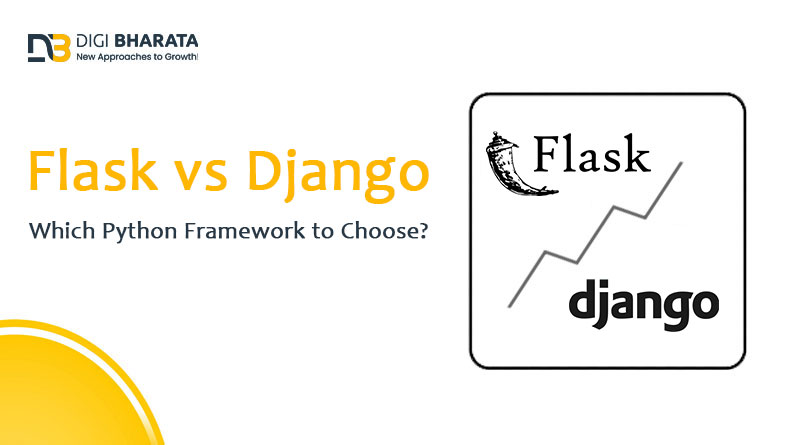Web development has become an important part of every business these days and everyone starts exploring digital marketing for reach and growth.
Making a website according to the ideal customer or your target audience is essential. Web development has become complex because of high-end product requirements and developers required a framework to deliver a fully functional website.
Now we’ll see what is the framework and how it is connected with Flask and Django.
Table of Contents
What is a Framework of Flask and Django
The framework is a fully developed package of modules that help developers to write code for an application. It makes the web development process easier, faster, and more reliable.
Flask and Django fall into the types of frameworks that are used in Python programming. According to a survey by Developers Survey 2018, both of these programs are considered the most popular programs for web development.
To understand which is a better framework for web development, we have to know in detail about these frameworks.
What is Flask?
Flask is a microframework that is used for writing codes for applications. The framework was introduced by Armin Ronacher in 2011, it’s a joining of solutions i.e., Werkzeug and Jinja2.
Flask is categorized as a microframework because it doesn’t depend on any external libraries. It has its tools, technologies, and libraries to support web application development functionalities.
As it’s an independent and flexible framework many developers prefer to start with this Flask framework.
Features of Flask
Some key features of Flask are as follows:
#1. Independent
It gives full control and independence to the developers for creating an application and do experiment with the architecture or the libraries of the framework.
#2. Lightweight
It’s an independent framework which is why it’s a lightweight framework because it doesn’t depend on external libraries.
#3. Secure Cookies
Secure cookies enable the security of channels and confirm that an unauthorized person can’t access the information. Flask supports the secure cookies function.
What is Django?
Django is an open-source framework that was created by Adrian Holovaty and Simon Willison in 2003. It’s a high-level web framework that is built to make the process of web development easier and more efficient.
Developers choose Django so that it can limit the interference of the system, protocols, and management. The other name of Django is “framework for fussbudget with deadlines”. Django also helps to manage some basic functions such as site maps, client information, and many more. Its main focus is to complete the application work quickly.
Features of Django
Some features of Django are as follows:
#1. Versatile
Django enables developers to work on various platforms from content management systems to social network sites or news sites.
#2. Secure
Django gives security through its powerful authentic system or protocols to avoid unauthorised access, cyberattacks, etc.
#3. Adaptable
Django is an acceptable framework that is accepted by different formats like HTML, XML, JSON, and many more.
Also Check: Best Laptop for Developers
Difference: Flask vs Django
After reading in detail about Django and Flask, you must have noticed that there are some similarities and differences.
To understand which is better and for that, you need to look at the head-to-head comparison of these frameworks that highlight the difference.
| Flask | Django |
| Flask allows developers to use multiple types of database | Django doesn’t allow multiple types of databases. |
| Flask doesn’t offer dynamic HTML pages | Django offers dynamic HTML pages. |
| Flask used Ninja2 template design | Django is inspired by the Ninja2 template but has an inbuilt template that makes the process easier. |
| Flask allows full control to developers with no dependency on external libraries. | Developers don’t have full control over the functions or modules because of built-in libraries. |
| The working style of the Flask is diversified. | The working style of Django is monolithic. |
Which is Better: Flask and Django
Now you’re well aware of Flask and Django concepts and differences. These frameworks have their own features and characteristics.
To choose a framework you need to know the pros and cons of each framework. So, let’s start with Flask’s pros and cons.
| Pros of Flask | Cons of Flask |
|---|---|
| Suitable for small case projects. | Absence of a strong community for support and growth |
| Easy to build. | Complex maintenance for system updates |
| Database integration is easy. | Not suitable for big applications or projects. |
Here’re Django’s Pros and Cons.
| Django Pros | Django Cons |
|---|---|
| Support dynamic HTML pages | The codebase size is relatively larger |
| Highly secured framework | Prior knowledge of the framework is necessary |
| Supports fully featured administration interface | Too many functions and a high-end framework |
A Final Action
In the end, we arrived at our answer: which one is better?
Here we share Flask vs Django in this article. Both frameworks are important for any web developer. So, choose whichever you want to but master it like a pro because there are demands of an expert in the web development field. Knowing Python Flask and Django can put you on the priority list over the other candidates.





















+ There are no comments
Add yours